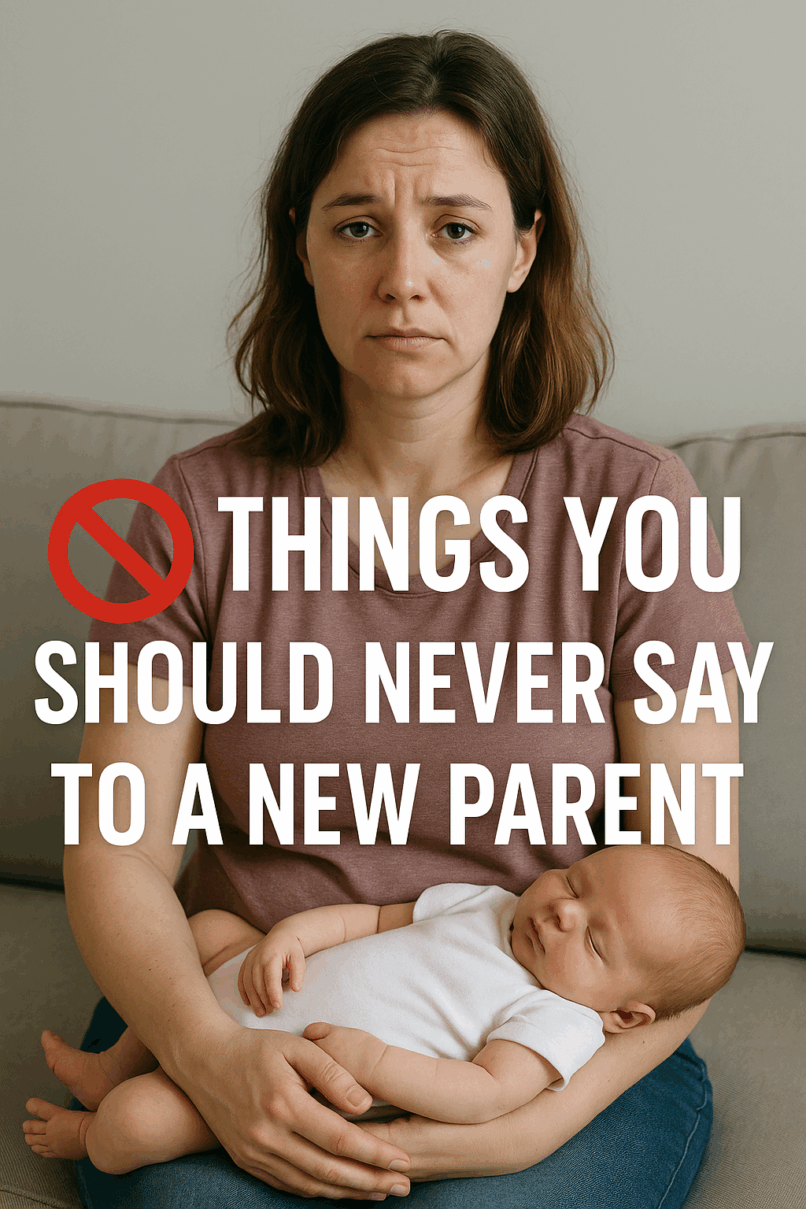
simply amazing, always for you.
The Unseen Weight of New Parenthood
Becoming a new parent is a life-altering transition—thrilling, chaotic, sleep-deprived, and often emotionally overwhelming. Between the constant feedings, diaper changes, crying fits, and new responsibilities, new parents are plunged into an entirely unfamiliar world. At this point, they are not looking for judgment or unsolicited advice. They are craving support, understanding, and a little grace.

Yet despite the best intentions of friends, family, coworkers, or even strangers, there are things said to new parents that cut deep. Some comments seem innocent, some come wrapped in concern, others are poorly timed jokes—but all can land with the force of judgment, shame, or pressure.
This article dives deep—beyond the surface-level “don’t ask if they’re tired”—to uncover the subtle and not-so-subtle things you should never say to a new parent, and why they matter more than you may think.
Chapter 1: Pressure Dressed as Politeness
“When are you having another one?”
On the surface, this may sound like light-hearted small talk. But in reality, it often opens a wound. Parenthood is deeply personal, and this question brushes aside whatever struggles—physical, financial, emotional, or relational—a parent may be enduring at the moment.
For some, childbirth may have been traumatic. Others may be facing postpartum depression, or complications that make future pregnancies difficult or risky. Then there’s the sleep deprivation and daily mental load that makes the idea of another baby feel like a cruel joke.
In essence, this question tells new parents, “What you’re doing right now isn’t enough.” It can make them feel like they should already be planning ahead when they are just trying to survive the present.
What to say instead:
“How are you adjusting to life with your new baby?”
“You look tired.”
They are. And they know it. This isn’t a revelation—it’s reality.
Pointing out someone’s exhaustion, especially a new parent, rarely comes off as empathetic. It often feels more like criticism, like being told they’re not handling this new phase well enough.
Instead of stating the obvious, offer kindness and validation. A parent who hasn’t slept more than two hours in a row doesn’t need a mirror—they need compassion.
What to say instead:
“I can only imagine how tough these days are—how are you holding up?”
Chapter 2: Judgments in Disguise
“Is the baby sleeping through the night yet?”
This question might seem harmless or just curious—but it’s loaded.
Sleep is one of the most stressful topics for new parents. Asking this question can sound like a performance check: “Are you succeeding at parenting yet?” If the answer is no (as it often is for months or even years), it can make parents feel like they’re failing.
Babies aren’t machines, and sleep patterns are as unique as fingerprints. Framing it like a milestone only serves to increase anxiety.
What to say instead:
“How’s everyone managing with sleep these days?”
“Are you breastfeeding?”
Whether asked out of curiosity, care, or personal belief, this question intrudes into a highly sensitive and complex area.
Some parents breastfeed. Some pump. Some use formula. Others do a mix. For some, breastfeeding is painful or impossible. For others, it comes with deep guilt or shame. Asking this question can unintentionally stir insecurity or shame, especially when followed with judgment-laced comments like “breast is best.”
What to say instead:
Don’t ask unless they bring it up. If they do, offer support, not opinion.
“You’re spoiling that baby.”
This outdated notion that meeting a baby’s needs equals “spoiling” has been disproven by science and psychology many times over. Babies cry because they need something—food, touch, sleep, warmth, or reassurance. Responding to those needs helps build secure attachment and trust.
Saying this to a new parent undermines their instincts and can introduce unnecessary doubt. What they need is encouragement, not cautionary tales from the 1950s.
What to say instead:
“It’s amazing how tuned-in you are to your baby’s needs.”
Chapter 3: The Weight of Comparison
“We never did it that way, and our kids turned out fine.”
Every generation parents differently. What worked or was considered “normal” 30 years ago might now be discouraged—or even dangerous—based on new evidence.
This comment dismisses a new parent’s research, education, and decision-making. It suggests their choices are wrong simply because they’re different. Worse, it pits old-school methods against modern understanding.
Parenting is not a contest of traditions. It’s an evolution based on love, safety, and growth.
What to say instead:
“Every generation has its way—sounds like you’re doing what works best for your family.”
“That’s a weird name.”
Names are personal. They often carry family history, cultural significance, spiritual meaning, or simply deep affection. Mocking or questioning a baby’s name is one of the fastest ways to offend a new parent.
Even a raised eyebrow or awkward silence after hearing the name can sting.
What to say instead:
“That’s such a unique name—what inspired it?”
“Let them cry it out.”
This is another parenting debate where opinions often clash. Whether or not a parent chooses to sleep train—or how they choose to do it—is a deeply personal decision.
Dropping a hard-line opinion like “let them cry it out” can feel like a condemnation of any other approach.
What to say instead:
“Sleep can be so tough. Every baby is different—what’s been working for you so far?”
Chapter 4: Minimizing Their Experience
“Enjoy every moment!”
This comment is well-meaning, but it can feel like a slap in the face when parents are buried in diapers, screaming, and a complete loss of identity.
Not every moment is magical. Many moments are hard. Dirty. Painful. Uncomfortable. Telling someone to enjoy it all, without allowing space for struggle, can make them feel guilty for not loving every second.
What to say instead:
“It’s okay if this is hard—most of us have been there.”
“Your body will bounce back soon.”
This one is particularly damaging. It tells new parents—especially mothers—that their bodies are something to “fix,” not celebrate.
A postpartum body has been through a monumental event. It should be honored, not scrutinized. This kind of comment reinforces toxic body image expectations and rushes healing.
What to say instead:
“You are incredibly strong. What you’ve just done is nothing short of amazing.”
“Don’t worry, it gets easier.”
Again, well-intentioned but hollow. In the throes of newborn exhaustion, this sounds dismissive. It glosses over the real pain and struggle of the moment.
Every stage of parenting brings new challenges. Telling someone that relief is around the corner can make them feel isolated when it doesn’t come fast enough.
What to say instead:
“This is such a tough time. You’re doing great—one day at a time.”
Chapter 5: Language That Hurts More Than It Helps
“You’ve got your hands full.”
This is often said with a laugh, but to a stressed parent trying to juggle bags, bottles, and a screaming baby in public—it’s not funny. It can feel like being judged in a moment of struggle.
What to say instead:
“Can I help with anything?”
“Why don’t you just sleep when the baby sleeps?”
This advice has become a meme because of how disconnected it is from reality. Most parents will tell you that when the baby sleeps, it’s the only time to clean, cook, catch up on work, or maybe take five minutes for themselves.
What to say instead:
“Is there anything I can do to take something off your plate today?”
“You’re doing it wrong.”
Unless a child is in danger, this statement should never pass your lips. Parenting is learned through practice, trial, and many, many errors. No one gets it perfect. And even if you think you know better, your comment could crush a new parent’s fragile confidence.
What to say instead:
“Mind if I share something that helped me when I went through this?”
Chapter 6: How to Truly Support New Parents
Instead of saying things that might shame, confuse, or burden new parents, try to be the person who builds them up. Here are some deeply supportive things you can say instead:
- “You’re doing an amazing job, even if it doesn’t feel like it today.”
- “It’s okay to feel overwhelmed. I’m here for you.”
- “Your baby is lucky to have you.”
- “You deserve a break—can I help with anything?”
- “Tell me how you’re really doing.”
Support can also come in the form of silence, listening, or simply sitting beside them without comment. New parents often don’t need advice—they need presence.
Speak With Compassion, Not Judgment
New parenthood is a vulnerable time. It brings out insecurities, questions, exhaustion, and fears, even as it also unlocks deep love and joy. Words—more than ever—can build someone up or tear them down.
Whether you’re a friend, a relative, a coworker, or a stranger in the grocery store, your words can shape a parent’s day. Choose them carefully.
Sometimes the most powerful support doesn’t come from giving advice—but from offering empathy, silence, a listening ear, or a helping hand.
Now over to you: If you’ve ever been a new parent, what was the most hurtful—or the most helpful—thing someone said to you during that time? Let’s open the conversation.
SUGGESTED READS
- I Tried the One-Minute Parenting Method—Here’s What Happened
- When the Nest Empties: How to Reinvent Parenting and Reclaim Your Life
- How to Handle Puberty with Your Teenager: A Complete Parent’s Guide
- How to Transition Your Baby from Crib to Bed: A Gentle Yet Effective Guide for Parents
- How to Talk to Your Teen About Relationships and Dating: A Guide to Raising Emotionally Intelligent, Respectful Young Adults

Support Our Website!
We appreciate your visit and hope you find our content valuable. If you’d like to support us further, please consider contributing through the TILL NUMBER: 9549825. Your support helps us keep delivering great content!
If you’d like to support Nabado from outside Kenya, we invite you to send your contributions through trusted third-party services such as Remitly, western union, SendWave, or WorldRemit. These platforms are reliable and convenient for international money transfers.
Please use the following details when sending your support:
Phone Number: +254701838999
Recipient Name: Peterson Getuma Okemwa
We sincerely appreciate your generosity and support. Thank you for being part of this journey!